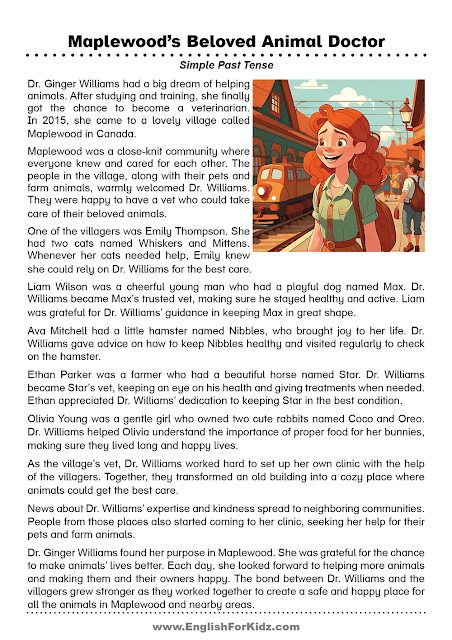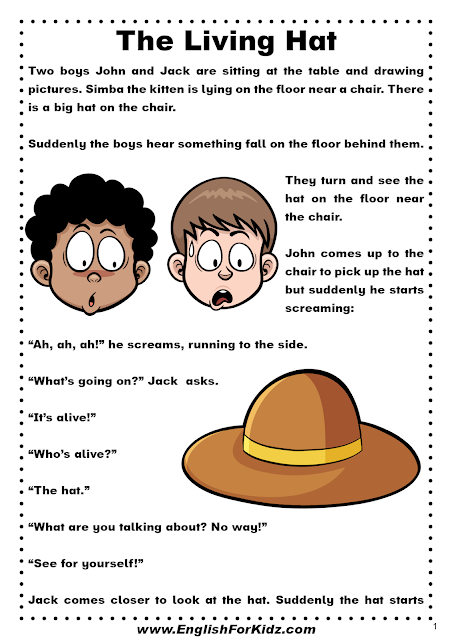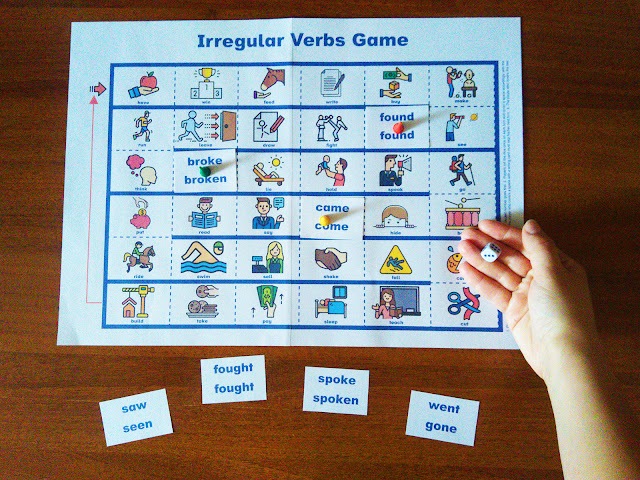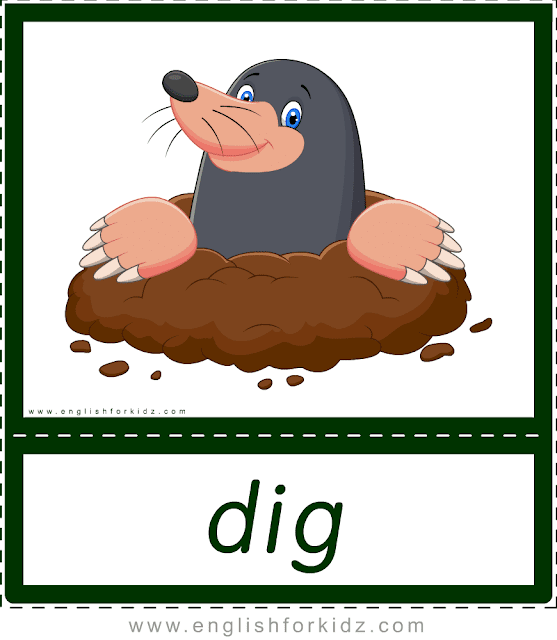In this blog post, I'm excited to share the final part of my reading comprehension project—this time focusing on the simple future tense! This project was designed to help young English learners better understand basic verb tenses through engaging reading passages and worksheets. With these printable resources, learning grammar becomes not only effective but also fun!
Showing posts with label verbs. Show all posts
Showing posts with label verbs. Show all posts
Monday, October 28, 2024
Monday, June 17, 2024
Present Continuous Tense Reading Comprehension
I'm excited to continue sharing with you my reading comprehension project, designed to make learning English grammar both fun and engaging for our young students. As you may already know, this project features the heartwarming stories of Dr. Ginger Williams, a beloved vet in the cozy Canadian village of Maplewood.
Monday, May 6, 2024
Verb “to be” Reading Comprehension and Exercises
Hey there, fellow English teachers! I have a new reading comprehension project to share with you. It is centered around the verb "to be" and designed to engage students while reinforcing essential grammar concepts. The verb "to be" is a cornerstone of language learning, and I've found that dedicating some quality time to this little powerhouse can work wonders for my students' understanding of grammar.
Thursday, March 14, 2024
Illustrated Irregular Verb Charts
Are you tired of the same old methods for teaching irregular verbs in your ESL classroom? Do your students struggle to memorize irregular verb forms? If so, you're not alone. As an ESL teacher, I've experienced firsthand the challenges students face when trying to master irregular verbs. That's why I've created a solution to make learning these tricky verbs easier and more enjoyable.
Monday, January 15, 2024
Present Perfect Tense Reading Comprehension
I'm thrilled to share more goodies from my English teaching arsenal. If you've been following along, you know I've been crafting a series of reading comprehension materials designed to make English verb tenses not just understandable but downright enjoyable for kids. Today, let's dive into the latest addition to the collection – the present perfect tense.
Friday, September 15, 2023
Simple Past Tense Reading Comprehension
Hi, fellow teachers! I'm back with more exciting stuff for English classes. I've been working on a set of reading comprehension texts and worksheets to keep my grammar lessons more engaging and enjoyable, and today, I’d like to show you my simple past tense reading comprehension materials.
Thursday, July 20, 2023
Simple Present Tense Reading Comprehension for Young Learners
I'm excited to share with you a set of reading comprehension texts and worksheets that I designed to make English grammar classes more enjoyable for my young students. As a language teacher, I know how learning grammar can be a bit boring for kids, so I created this series of printable resources to keep them engaged and motivated.
Friday, February 4, 2022
Present Continuous Reading Texts
Teaching English to young students, I do my best to offer kids interesting texts for reading. Kids do not need to be bored during English classes as boring teaching materials are bad for memorizing stuff. I try to incorporate reading into every topic we learn including grammar. I’ve always experienced problems with finding child-appealing texts for grammar topics. The recent classes dedicated to the present continuous tense (aka present progressive) showed that I badly needed a decent story with simple sentences containing this grammar structure to read with my students. So I decided to adapt one of my reading comprehension sets for my present continuous classes.
Monday, March 23, 2020
Irregular Verbs Game
I remember the days when I was studying English irregular verbs at school. It was… well… boring to say the least. The concept of irregular verbs sounds weird to non-native speakers. All those irregular verbs lists and tables that many textbooks and dictionaries offer look intimidating to school kids. No wonder children have a hard time memorizing these verbs and their forms. Many grammar exercises designed to teach kids how to use irregular verbs do not boost young students’ memory either. Because all too often they are as boring as the long lists and tables in the textbooks. So I decided to add a little bit of fun into learning irregular verbs by offering my young students a printable board game. This irregular verbs game makes it easier for kids to memorize these special words and their forms thanks to lots of visually-appealing pictures and competitiveness of a game.
I have designed three printable game boards with some variations for kids to better memorize irregular verbs through a fun and visually enhanced activity. In my opinion, gamification is one of the best teaching methods to boost kids’ memory. This board game helps students memorize more than 80 English irregular verbs. Here are pictures of one of the game boards and its variations.
Tuesday, March 3, 2020
Printable Flashcards: Animal Actions. Part 2.
Here is another bunch of printable flashcards that I have designed to teach animal action verbs to my young students. There is a set of 56 animal actions flashcards that belong to the big animal-related reading comprehension kit. This kit has more than 280 flashcards besides reading comprehension passages and worksheets.
BUY THE WHOLE READING COMPREHENSION KIT IN PRINTER-READY PDF FILES
*****
BUY THE ANIMAL ACTIONS FLASHCARDS ONLY
*****
BUY THE ANIMAL ACTIONS FLASHCARDS ONLY
Sunday, November 3, 2019
Reading Comprehension Worksheets: Short Word Stories
I shared some of my animal-related reading comprehension worksheets on social networks, and my fellow EFL and ESL teachers found them rather interesting. So I’d like to demonstrate another type of reading comprehension passages that I use for my English classes.
I love this trick when I ask early readers to read a relatively long and seemingly intimidating English text, and they suddenly realize they can easily read it and understand most of it. Their reaction is always very positive and they feel proud of their reading accomplishments. So I write these reading comprehension passages consisting only of short words (mostly three-letter words and a few four-letter words). I often use these passages with my elementary school students (first and second grade) as well as with older kids who struggle to learn English as a foreign language.
I have written six short-word reading comprehension passages so far. I call them short word stories. And I have recently decided to add some tasks and questions to the stories to turn simple texts into colorful printable worksheets that would be more appealing to elementary school children. Such reading comprehension worksheets definitely bring more fun to the classroom and encourage kids to further develop their English reading fluency.
So I have designed some printable worksheets that incorporate the following reading comprehension passages:
- My Dad Is a Vet [78 words]
- My Dad and My Pal Are Eating a Pie [88 words] (I use this one to teach the present continuous tense)
- Can I Get a Pet? [88 words]
- A Van for My Big Dog [115 words]
- Can I Own a Van? [145 words]
- An Ant Bit My Toe [291 words] (this one is good for teaching different meanings of the verb “get”)
I’d like to share a few reading comprehension worksheets based on my short word stories. So here they are:
 |
| Reading comprehension passage "My Dad Is a Vet". |
Saturday, October 12, 2019
Irregular Verbs Flashcards. Part 2.
Here are another ten printable flashcards that I created to help my students memorize irregular English verbs. I have designed enough cards to teach 92 irregular verbs. This batch of flashcards features the following verbs: catch, choose, come, cost, cut, dig, dive, draw, dream, drink.
Friday, August 30, 2019
Printable Flashcards to Learn 92 Irregular Verbs
Irregular verbs are considered to be one of the most challenging English grammar aspects especially for non-native speakers who start learning the language. This is why I have to return to the subject of irregular verbs now and then to help my students retain all the verb forms in their memories. Although I have plenty of grammar books, worksheets and other materials such as printable puzzles for teaching irregular verbs, there seems to be never enough resources for this incredibly hard part of the English language. It is especially true when it comes to teaching English to small kids who are very reluctant to memorize boring stuff. So, trying to make the process of learning irregular verbs more fun, I have designed a set of colorful printable flashcards.
I have created irregular verbs flashcards that incorporate the base form, simple past and past participle of the verbs along with relevant pictures helping form the association between words and their meaning. Since the majority of people are visual learners, I thought the visually appealing flashcards would help me effectively teach even the most boring grammar stuff to young students. Teachers using these flashcards can also cut off the simple past and past participle part to use it for some matching activities in the classroom. The flashcards are rather large and can be easily printed on A4 paper sheets or bigger formats if needed.
My collection of images allowed me to create flashcards to learn 92 irregular verbs. Here is a list of all of them: be, beat, become, bite, blow, break, bring, build, burn, buy, catch, choose, come, cost, cut, dig, dive, draw, dream, drink, drive, eat, fall, feed, feel, fight, find, fly, forbid, forget, freeze, get, give, go, grow, hang, have, hear, hide, hit, hold, hurt, know, lead, learn, leave, lend, let, lie, lose, make, mean, meet, pay, put, read, ride, ring, rise, run, say, see, sell, send, sew, shake, shine, shoot, show, sing, sink, sit, sleep, slide, smell, speak, spend, spread, stand, steal, sweep, swim, swing, take, tell, think, throw, understand, wake, wear, win, write.
I will be publishing my irregular verbs flashcards on my blog in the form images. My fellow EFL and ESL teachers and parents are welcome to use them for English classes. If you need high resolution printer-ready PDF version of this set of flashcards, you are welcome to buy it here.
Here are the first 10 printable irregular verb flashcards.
Friday, April 12, 2019
Irregular Verbs Puzzle Flashcards (Part 3)
Today I would like to share another part of my irregular verbs puzzle flashcards set. You can find other verb cards in my previous posts dedicated to this grammar topic. Irregular verbs are an essential and challenging part of learning English, but it's often rather difficult for students to remember them. My set of printable colorful puzzles helps children master three forms of irregular verbs fast and easily.
BUY MY IRREGULAR VERBS FLASHCARDS IN A PRINTER-FRIENDLY PDF FILE
The kit has 105 irregular verbs puzzle flashcards
The kit has 105 irregular verbs puzzle flashcards
This post contains 16 irregular verb puzzles for the following words.
slide – slid – slid
light – lit – lit
hit – hit – hit
let – let – let
set – set – set
spread – spread – spread
cut – cut – cut
shut – shut – shut
put – put – put
hurt – hurt – hurt
burst – burst – burst
cost – cost – cost
lose – lost – lost
get – got – got
tell – told – told
sell – sold – sold
light – lit – lit
hit – hit – hit
let – let – let
set – set – set
spread – spread – spread
cut – cut – cut
shut – shut – shut
put – put – put
hurt – hurt – hurt
burst – burst – burst
cost – cost – cost
lose – lost – lost
get – got – got
tell – told – told
sell – sold – sold
 |
| Irregular verb "slide" |
Thursday, November 8, 2018
Irregular Verbs Puzzle Flashcards (Part 2)
Today I would like to share another part of my irregular verbs puzzle flashcards set. In the first post related to English irregular verbs I explained the difficulty of learning this grammar topic. I hope my puzzles will help your students and children master the English language better.
BUY MY IRREGULAR VERBS FLASHCARDS IN A PRINTER-FRIENDLY PDF FILE
The kit has 105 irregular verbs puzzle flashcards
The kit has 105 irregular verbs puzzle flashcards
This post contains 19 irregular verbs flashcards designed in yellow color. All these verbs have the letter t at the end of their Past Simple and Past Participle forms. Some verbs change the vowel sound in the middle of the verbs, like in sit – sat – sat, meet – met – met. Some verbs ending with d replace it with t, for example send - sent - sent, build - built - built. Sometimes t is just added to the whole word changing the pronunciation, like in deal – dealt – dealt, mean – meant – meant.
Here is the list of today's irregular verbs:
sit – sat – sat
meet – met – met
feel – felt – felt
smell – smelt – smelt
leave – left – left
send – sent – sent
spend – spent – spent
lend – lent – lent
deal – dealt – dealt
mean – meant – meant
dream – dreamt – dreamt
sleep – slept – slept
keep – kept – kept
sweep – swept – swept
build – built – built
spoil – spoilt – spoilt
burn – burnt – burnt
learn – learnt – learnt
hear – heard – heard
meet – met – met
feel – felt – felt
smell – smelt – smelt
leave – left – left
send – sent – sent
spend – spent – spent
lend – lent – lent
deal – dealt – dealt
mean – meant – meant
dream – dreamt – dreamt
sleep – slept – slept
keep – kept – kept
sweep – swept – swept
build – built – built
spoil – spoilt – spoilt
burn – burnt – burnt
learn – learnt – learnt
hear – heard – heard
 |
| Irregular verb "see" |
 |
| Irregular verb "meet" |
Thursday, October 11, 2018
Collocations Worksheets: Verb "Have"
In today’s article I would like to share the first part of my new collection of English collocations. First of all it should be defined the meaning of this concept.
A collocation is a common word combination of two or more words that usually go together in a way that sounds correct. Understanding this helps English learners improve their fluency and speak more natural. The meaning of a collocation might not be expected from the meaning of its separate words therefore it is extremely important to learn the meaning of some groups of words you can come across frequently.
This post introduces common collocations with the verb have. Below you can find the list of these collocations.
 |
| List of collocations with the verb have |
Wednesday, June 20, 2018
Irregular Verbs Puzzle Flashcards (Part 1)
Today I have a wonderful opportunity to share my new set of irregular verbs puzzle flashcards with fellow teachers and parents. Everybody knows all English verbs can be divided into two groups: regular and irregular. Past Simple and Past Participle forms of the regular verbs are built by adding -ed to the main form. Irregular verbs aren’t formed according to this general rule. There’s no rule of building them at all. Children should just remember these forms by heart.
The kit has 105 irregular verbs puzzle flashcards
Teaching irregular verbs to ESL students can be a rather challenging task. There are many types of activities a teacher can use while introducing this grammar topic to children. Based on my experience, I’ve designed a colorful set of irregular verbs flashcards in the form of puzzles as an interesting way of practicing irregular verbs while playing. Each puzzle contains an image illustrating an irregular verb. Then there are three pieces with the Infinitive, Past Simple and Past Participle forms of the verb. Below you can see some examples of using these forms in sentences. I used only such tenses as Present Simple, Past Simple and Present Perfect so that kids could focus on these irregular forms without getting lost in the complicated system of English tenses and structures.
Tuesday, September 9, 2014
I Can. Action Verbs Song for Kids (+ Flashcards and Worksheets)
My vacation is over and I am back to share my new songs, worksheets and other educational materials to help ESL teachers make their English lessons more fun and engaging.
Here is my new song I have written to teach the verb “can”, some action verbs and names of animals. This very simple song is suitable for fun activities while singing even with the smallest children. For example, in the course of singing the song kids could repeat actions of animals as seen in the little cartoon below which would certainly stimulate young learners’ cognition and memory.
Subscribe to:
Posts (Atom)












